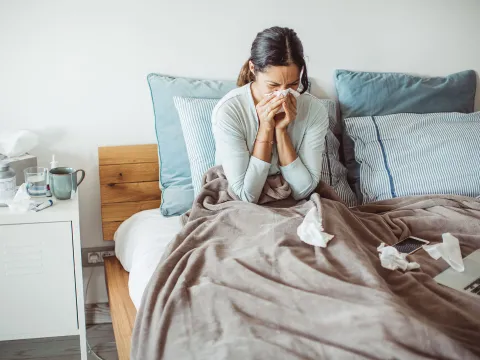- AdventHealth

As the coronavirus outbreak continues to spread, at some point you might have a loved one who becomes infected with the virus. If your physician advises that they can recover safely at home, you can help support them — and keep yourself and other family members healthy — by following a few general tips.
Encourage Rest and Hydration
According to the World Health Organization (WHO), there is no specific treatment for coronavirus. Antibiotics do not help against a virus, and there’s no antiviral medication shown to help fight symptoms of the new virus.
For those with mild symptoms, the best treatment is to get plenty of rest and stay hydrated. You can help by making sure your loved one has everything they need at home until they’re feeling better.
- Keep an eye on symptoms. If your loved one’s symptoms worsen or if they’re having trouble breathing, call your physician right away. Do not bring your family member to the doctor’s office without calling first.
- If anyone else in your family develops symptoms such as a cough, fever or shortness of breath, call your doctor right away.
- Take over caring for any pets in the home while your loved one is ill. Although there are no known cases of spreading coronavirus to a pet, the CDC recommends those with coronavirus avoid close contact with pets until more is known about the spread of the virus to animals.
How to Prepare Your Home
When taking care of a sick family member at home, the Centers for Disease Control and Prevention (CDC) recommends creating a special “sick room” where your family member can recover away from others in your home.
Your ill loved one should remain in this room and away from other family members as much as possible. Having the patient use a separate bathroom is also a good idea, if one is available. To allow your family member to rest, and to help prevent the spread of illness, don’t allow outside visitors in your home unless absolutely necessary.
Stock Up on Supplies
Stock up on food and household supplies so you can limit trips to the store. You should also refill any medications your loved one is taking, so you’ll have extra on hand.
Designate yourself or another family member to go out for any needed supplies, such as groceries and prescriptions. Your loved one should not leave the house for work, school or shopping until they’re feeling better.
Best Steps for Good Hygiene
You’ll want to keep your loved one as comfortable as possible during their recovery, but it’s also important to keep other family members healthy. You can do this by following some basic hygiene rules.
- Provide the sick family member with a lined wastebasket and ask that they use it to dispose of soiled tissues and other disposable items they have touched.
- Wear disposable gloves when handling any items that may contain the patient’s body fluids, such as saliva or nasal discharge. After removing the gloves, wash your hands thoroughly with antibacterial soap and water for at least 20 seconds, or use a hand sanitizer.
- Don’t share items like towels, bedding, drinking glasses, dishes or eating utensils with your sick family member, and be sure to thoroughly wash any items they’ve used.
- Wash your sick loved one’s soiled laundry right away and dry completely, using the highest temperature setting recommended for the fabric.
- Clean high-traffic household surfaces with a cleaning spray or disinfectant wipe at least once a day. These include doorknobs, countertops, cabinets, sink fixtures, toilets, bedside tables, phones and keyboards. For most effective cleaning, follow the label instructions. You can get more cleaning tips from the CDC.
- Try not to touch your face — especially your eyes, nose and mouth — with unwashed hands.
What are the Rules for Recovery?
Your loved one should remain home until they’re no longer ill. Generally, people with COVID-19 are no longer contagious once:
- They’ve been free of a fever for at least 72 hours
- Their other symptoms have improved, and
- It’s been at least seven days since first developing symptoms
If you have any questions about these guidelines or when it’s safe for your loved one to come out of isolation, talk with your physician or read the full recommendations from the CDC.
More Answers to Your Questions
At AdventHealth, we’re here to support you through the coronavirus outbreak. Visit our Coronavirus Resource Hub for regular coronavirus updates, answers to your coronavirus FAQs and more important information for keeping your family safe.


